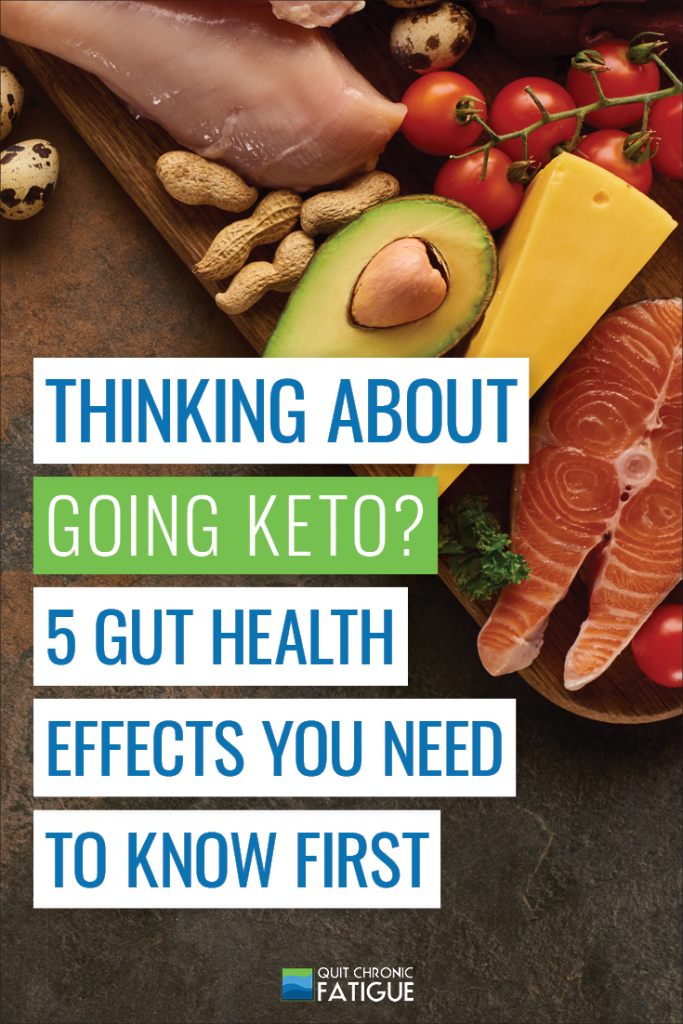The ketogenic “keto” diet has gained a ton of popularity over the last few years for its low-carb, high-fat lifestyle. Lots of people choose to go keto to control their blood sugar, lose weight, or improve cholesterol levels. But keto can impact gut health, too, and not necessarily in beneficial ways.

What Is the Keto Diet?
A keto diet takes a person’s usual carbohydrate intake and replaces it with heart-healthy fats and protein. This forces your body into ketosis to burn fat for energy instead of carbs, which is why many go keto to lose weight.
You can change the specific fat/protein/carb ratio of each meal based on your own health needs, but people following keto typically consume less than 50 grams of carbs per day. This can seriously restrict your diet, as the list of acceptable keto fruits and vegetables (which are typically rich in carbs) is limited. Eating too much protein can inhibit your body’s ability to reach ketosis, leading many to restrict their protein intake as well.
How Does Keto Affect Gut Health?
If you’re considering going keto, know that your gut health will be impacted, just like with any diet change. Before you run to the grocery store, here are five ways keto affects gut health you need to know.
It Can Lower Your Fiber Intake
The foundation of the keto diet is to cut out high-carb foods from your daily meal plan. But a lot of these foods (especially fruits, veggies, legumes, and grains) are also high in fiber. And you need fiber to maintain your gut health.
Fiber is essential to a healthy gut. It keeps your bowel movements regular by slowly passing through your digestive system. Not getting enough fiber in your diet can cause constipation and put you at risk of developing GI disorders like stomach ulcers, diverticulitis, and GERD.
To maintain your gut health while keto, keep some fiber in your diet by eating nuts and seeds, and turn to low-carb fruits and veggies for your produce.
The Keto Diet Removes Many Irritating Foods From Your Diet
One way a restrictive keto diet benefits gut health is by cutting out irritating foods known to cause digestive issues. The two biggest culprits to take off the table? Gluten and refined sugar.
Gluten is a protein found in grains like wheat, barley, rye, and spelt (along with non-gluten-free oats) that is a well-known gut irritant. Many people experience digestive issues after eating gluten-filled foods such as bread and pasta — the most serious symptoms are associated with celiac disease, an autoimmune disease triggered by gluten, and non-celiac gluten sensitivity. Even people without those conditions majorly calm their gut once letting go of gluten.
Second on the list is refined sugar, which is found in processed pastries, caffeinated drinks, condiments, and spreads. A high-sugar diet causes a lot of inflammation throughout your body and can even damage your gut. Cutting out refined sugar is super beneficial for your gut health, keto or not.
Keto Can Change Your Gut Microbiome
Your gut microbiome is the collection of microorganisms that live along your digestive tract and keep your system in balance. But when your microbiome gets thrown off, gastrointestinal issues start to arrive. Maintaining a strong microbiome is essential to good gut health.
Switching over to a keto diet can impact gut health by changing your microbiome — for better or worse. Such a restrictive diet can damage the healthy composition and concentration of bacteria within your gut microbiome. This can increase inflammation along the digestive tract, leading to GI woes.
However, the keto diet could also help your microbiome by reducing the concentration of harmful bacteria that cause diseases like salmonella and escherichia. It all depends on the unique composition of your gut.
Going Keto for Gut Health May Reduce Digestive Disorder Symptoms
Since so many irritating foods are left out of the keto diet, switching over to it can reduce certain digestive disorder symptoms. Irritable Bowel Syndrome (or IBS) symptoms, in particular, can improve when you leave carbs in the dust.
This is because many carb-rich foods contain FODMAPs: fermentable oligosaccharides, disaccharides, monosaccharides, and polyols (try saying that five times fast!). Limiting your FODMAP intake while on keto can improve gut health and relieve symptoms like gas, bloating, and abdominal cramps — whether you have IBS or not.
A Keto Diet Is Limited and Can Increase Your Risk of Nutrient Deficiency
A trademark of the keto diet is how limited it is, which can spell trouble for your gut health. You’re at serious risk of nutrient deficiency while following a keto meal plan.
Eating keto means eliminating some of the best foods for your microbiome, like fruits, veggies, and whole grains. Though you have your macronutrients covered with carbs (limited as they are), fat, and protein, it’s the micronutrients you have to worry about.
Missing out on those nutrient-dense foods can lead to deficiencies of crucial micronutrients, like B and C vitamins, magnesium, and selenium. All of these play an important role in supporting your microbiome and keeping you healthy. Plus, decreased diet diversity means decreased gut microbiome diversity — which is not good for your gut health while keto.
4 Keto Foods That Improve Gut Health
Navigating keto and gut health can be difficult, especially when you’re just starting out. To make it a little easier, add these four keto foods that improve gut health to your shopping list.
Yogurt
A breakfast classic, yogurt is a great choice to give your keto gut health a boost with fat, protein, and low carbs.
Eat it as is for a simple start to your day, or top it with keto-friendly berries and granola for a burst of flavor. Just make sure you pick a low-sugar option when scouring the shelves on your next grocery run.
Avocados
Avocados are staples in the keto diet, for breakfast, lunch, and dinner. They’re full of heart-healthy fats and are a great source of fiber, all while being low in carbohydrates (the perfect keto veggie!).
And the nutrients found in avocados also feed the good bacteria in your gut.
Leafy Greens and Cruciferous Veggies
Lots of carb-filled vegetables are off-limits on the keto diet, but leafy greens like arugula, kale, and spinach are low in carbs but full of essential micronutrients like vitamin C, antioxidants, and vitamin K.
Cruciferous veggies are perfect for maintaining your gut health while keto, too! Cauliflower, broccoli, and Brussels sprouts are full of antioxidants to support your microbiome and immune system but don’t contain tons of carbs.
Pickles
Pickles are one of the best foods you can eat for your gut health while on a keto diet—as long as they’re naturally fermented!
Watch out for vinegar and added sugar on the ingredient list while shopping for groceries. Naturally fermented pickles have very few carbs but are full of healthy probiotics that will promote the growth of good, gut-healthy bacteria in your microbiome.
Following the keto diet impacts gut health by altering your gut microbiome and reducing your nutrient intake, but also cuts out some seriously inflammatory foods. As with any major dietary change, be sure to talk to your doctor before switching up your pantry. Whatever direction you choose regarding keto and gut health, make sure you do what feels good in your gut.




